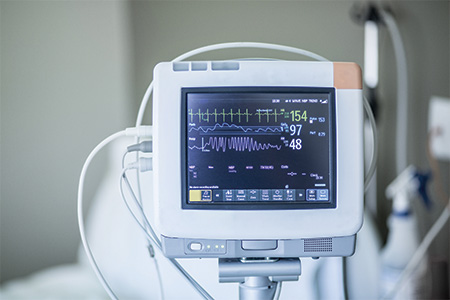ECG for Pets
 When you or your veterinarian are concerned about your pet’s cardiac health, you want a simple and noninvasive test. That’s why we offer electrocardiograms as part of our suite of diagnostic options to determine your pet’s heart health.
When you or your veterinarian are concerned about your pet’s cardiac health, you want a simple and noninvasive test. That’s why we offer electrocardiograms as part of our suite of diagnostic options to determine your pet’s heart health.
An ECG is one of the most commonly used and safest diagnostic tools for evaluating your pet’s cardiac health. It records the electrical impulses given out by your pet’s heartbeats and amplifies them 3,000 times to generate a report for your pet’s doctor to evaluate. You can rest easy knowing your pet is getting the most accurate results possible without discomfort.
Why did my pet’s doctor order an ECG?
If your veterinarian suggests an ECG, don’t be alarmed. ECGs aren’t a sure sign of a cardiac concern. Any of the following indicators are reasons for performing one:
- Heart rhythm that’s difficult to hear clearly on a physical exam
- Potential irregular heart rhythm
- Monitoring of a drug with cardiac side effects
- In preparation for and during general anesthesia
- Fainting or respiratory symptoms
- Confirmation of a preliminary imaging diagnosis
Don’t be afraid to ask if you’re unsure why your pet is receiving an ECG. You are part of your pet’s care team and deserve all the information available to find out what your pet’s doctor is looking for.
How is an ECG performed, and what does it do?
The main objective is to keep your pet as comfortable as possible. We’ll help him lie down on his side, and then electrodes are gently attached to his elbows, knees, and/or chest wall. The electrical impulses of the ECG are completely painless; your pet won’t feel anything at all!
As the machine monitors your pet’s heart, it can detect even tiny irregularities in the rhythm. The entire test takes just a few minutes, and a member of our staff is with your pet the entire time. Because our ECG equipment is in-house, we can immediately read the results and discuss them with you. If there are concerns, a veterinary cardiologist will be consulted to discuss additional diagnostics or treatments that may be needed to optimize your pet’s heart health.
If your vet has determined your pet needs more thorough cardiac monitoring, your pet will be referred to a cardiologist, who will likely have him wear a Holter ECG. The Holter is an ambulatory monitor that wraps around your pet’s torso comfortably and stays on for 24 to 72 hours. The test results are recorded and sent to the cardiologist for evaluation. Your pet can continue his usual routine without disruption while wearing the Holter.
What does an ECG check for?
An ECG detects electrical problems in the heart, including irregular heart rates and arrhythmias. This can help your veterinarian diagnose certain types of underlying heart disease. It also serves as a complementary diagnostic for heart enlargement, electrical impulse abnormalities, and valve disease.
ECGs are also used to monitor pets while under anesthesia. It gives a real-time view of your pet’s heart rate and rhythm. This is vital to keeping him as safe as possible while under anesthesia. It also allows the veterinarian to monitor the effects of drugs and medications administered during the procedure, provides valuable information about the depth of anesthesia your pet is under, and determines the level of pain your pet experiences during surgery so appropriate changes can be made.
What’s important to remember, however, is that an ECG for pets is often only part of a larger diagnostic plan. If your vet suspects an irregularity that does not resolve itself during the initial test, he or she will discuss the next steps with you.
If you have any questions about an ECG for pets that one of our vets has ordered for your pet, give us a call. Our knowledgeable staff is happy to answer any of your questions.


